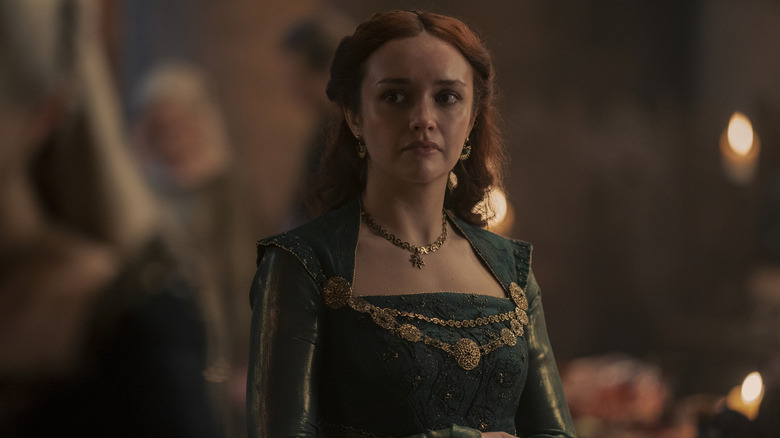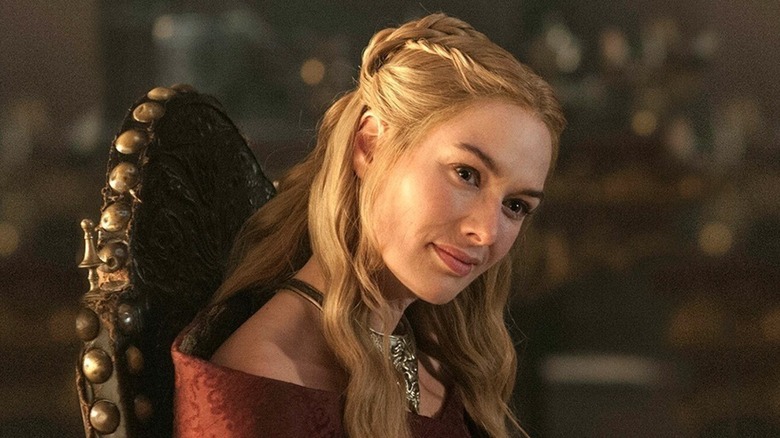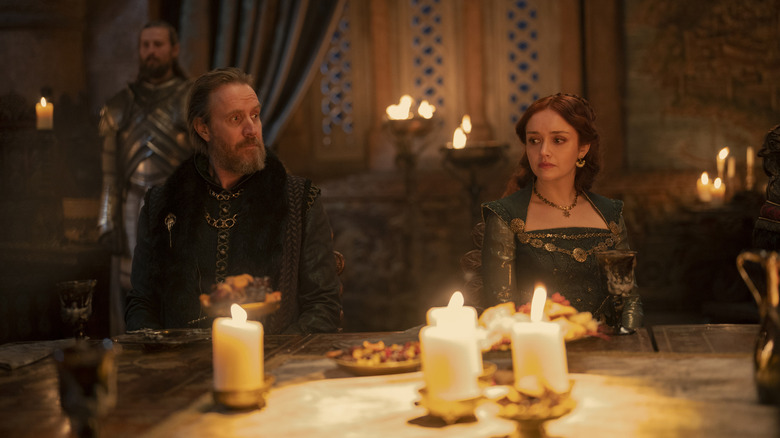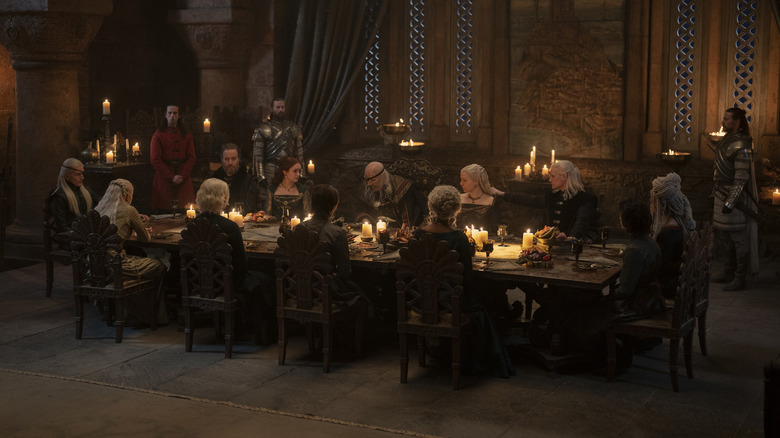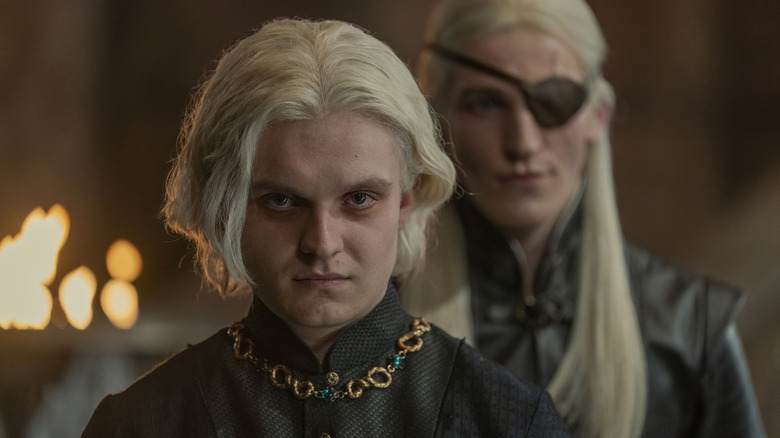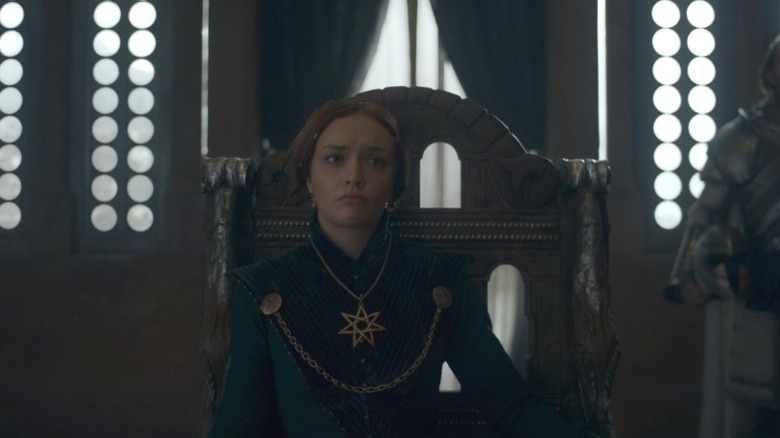How House Of The Dragon's Alicent Mirrors A Classic Game Of Thrones Character
This article contains spoilers for "House of the Dragon" episode 8 and all of "Game of Thrones."
There are some interesting parallels between "House of the Dragons" and its predecessor, "Game of Thrones," but one of the most compelling is the way Cersei Lannister's arc has been mirrored by that of Alicent Hightower (Olivia Cooke). Cersei, played by Lena Headey on "Game of Thrones," was a complicated villain whose ambition eventually got the best of her, and Alicent's ambitions are similarly intense. There are numerous similarities between them, including being married to a king they don't want and turning to their faith (or at least appearing to) in times of crisis.
Alicent is still very much her own character, but comparing her arc to Cersei's reveals interesting things about both characters, and how "House of the Dragon" learned some lessons about narrative storytelling from the stumbles of "Game of Thrones" later seasons. In episode 8, "The Lord of the Tides," audiences got to see a softer side of the queen for the first time since she was just a teen. There are very few true villains on "House of the Dragon," and absolutely no heroes, which means that Alicent is given a chance for complexity never afforded to Cersei.
Justice for the Red Queen
Ah, Cersei Lannister, you truly did deserve better. Sure, you eventually became an irredeemable monster who would burn it all down just to make sure she wasn't the only one who lost, but your hardcore heel turn and eventual demise was all too convenient and contrived. Cersei's future misery was foretold by Maggy the Frog when she was just a girl, and that shadow forever loomed over her life and decisions. She knew she would be queen, but was supposed to be married to Prince Rhaegar Targaryen, the then-heir to the throne. Unfortunately her own brother/lover Jaime killed King Aerys II and Robert Baratheon became king and her husband, which was worse than a death sentence for the ambitious, vivacious young Cersei.
Headey injected nuance into her performance where she could, and there are some brilliant moments where Cersei has moments of relatability or tenderness. In the season 2 episode "Blackwater," she helps young Sansa soothe her nerves with wine and contemplates poisoning her children to save them from the horrors an invading Stannis might unleash upon them. Her children were the thing that she lived for and would die for, knowing full well she was destined to outlive all three of them. (Thanks, Maggy!) In the end she was reduced to an archvillain, a smirking sliver of her former self, and I can only pray that the same doesn't happen to Alicent.
A helpless husband and some serious daddy issues
Both Cersei and Alicent have powerful political animals for fathers. While Cersei's pops was the inimitable Tywin Lannister (Charles Dance), Alicent's dear dad Otto Hightower (Rhys Ifans) is quite the mover and shaker himself. Tywin didn't give Cersei the attention or credit she deserved until far too late, but Ser Otto is much more willing to put faith in his daughter. This week he even told her that he finally sees her as someone who could win at the petty games of politics they're all playing, and it's clear that his words mean something to her even if she's unsure she wants the added pressure.
Nothing in Alicent's life has been her choice. She was married to Viserys when she was barely out of girlhood and a mother soon after, and she never could have anticipated that her husband would fall so ill. In the face of it all she has been steadfast, giving her entire self to her duties as wife, mother, and queen. Rhaenyra's abandonment of her responsibilities is an affront to Alicent, who has sacrificed everything and lived a life of servitude to her husband and thankless children. It's really no wonder that she finally snapped when Rhaenyra's kids cost her son Aemond his eye, or that she's bitter about Rhaenyra's place as Viserys' favorite. Who could really blame her?
Slightly better circumstances
Cersei was occasionally given moments where the audience could empathize or sympathize with her, but they were few and far between. She was first presented as the beautiful queen who had an incestuous relationship with her brother, the knight, and slowly morphed into a kind of "evil queen" stereotype with less nuance as time passed. It's easy to hate Cersei when you only watch "Game of Thrones" and don't read between the lines. Robert was drunk and abusive from nearly the start and spent more time in brothels than in his own bed, and she had been treated as no more than a pawn in other people's games her entire life.
Alicent is similarly trapped within the rules of her gender and station, but she has at least suffered less cruelty. She may have to struggle in helping Viserys with his illness, and she obviously never felt attracted to him, but there is clear love between them even if he's not always great at showing it. Her relationships with her husband and father aren't truly terrible, but like Cersei, she's also unfortunately the mother of a monster.
That jerk Joffrey and awful Aegon
Each of these complicated queens has an awful sociopath as a son, and at this point it's hard to tell which is worst. Cersei's son Joffrey was notoriously cruel and enjoyed torturing women in his room, but Aegon (Tom Glynn-Carney) might take the cake as a rapist who gets drunk and assaults his sister-wife. He's all Targaryen but has been set aside for his half-sister, Rhaenyra, and her children, and that just doesn't sit right with him. Alicent and Cersei both raised their eldest sons with the idea that they would be king one day, and unfortunately the results are spoiled, selfish, sadistic brats.
Both queens also have to deal with the collateral damage left in their sons' wake. Cersei would have to convince the young Sansa (Sophie Turner) to turn a blind eye to Joffrey's brutality, and in "The Lord of the Tides," Alicent must handle a delicate situation when Aegon rapes a servant girl. The rape itself is offscreen, thankfully, but we see Alicent as she comforts, then not-so-subtly threatens the traumatized victim. There's a moment where she's sympathetic to the girl and shows her true kindness, but it quickly turns into a way to remind her that others might not be so kind, and she manages to threaten the poor girl with a life of shame while still sounding softly sweet. Her treatment of Aegon is far less sweet, and when she's finished berating him for his behavior, she collapses into the arms of her daughter Helaena.
Looking to the light of the Seven
As they navigate their time as queens, Cersei and Alicent both turned to the faith of the land, which worships seven avatars of a single god that represent different aspects of life. Their symbol is the Seven Pointed Star, which Alicent can be seen wearing throughout "The Lord of the Tides." Cersei's entanglement with the church and its septons didn't end very well for anyone, with Cersei forced to take a walk of shame to atone for her infidelity and the entire Sept of Baelor going up in wildfire, but at least Alicent doesn't have to deal with the High Sparrow or his flock. So far, her embracing of the faith has seemed more personal than political. As a girl, she would go to the godswood for respite, but Oldtown and the Hightowers have always been devout followers of the Faith of the Seven, so her piety really shouldn't be a surprise.
Alicent has shown the same capacity for cruelty that made Cersei so hatable, both in her treatment of her son's victim and in her demands to see Rhaenyra's infant son immediately after his birth, but Cooke's layered performance and some smart writing have kept her from becoming a ridiculous Disney villain. "House of the Dragon" seems intent on doing better by its female characters, and Alicent's arc thus far is a massive improvement. Let's just hope they can maintain this level of nuance and character complexity.
New episodes of "House of the Dragon" debut Sundays on HBO and HBO Max.
